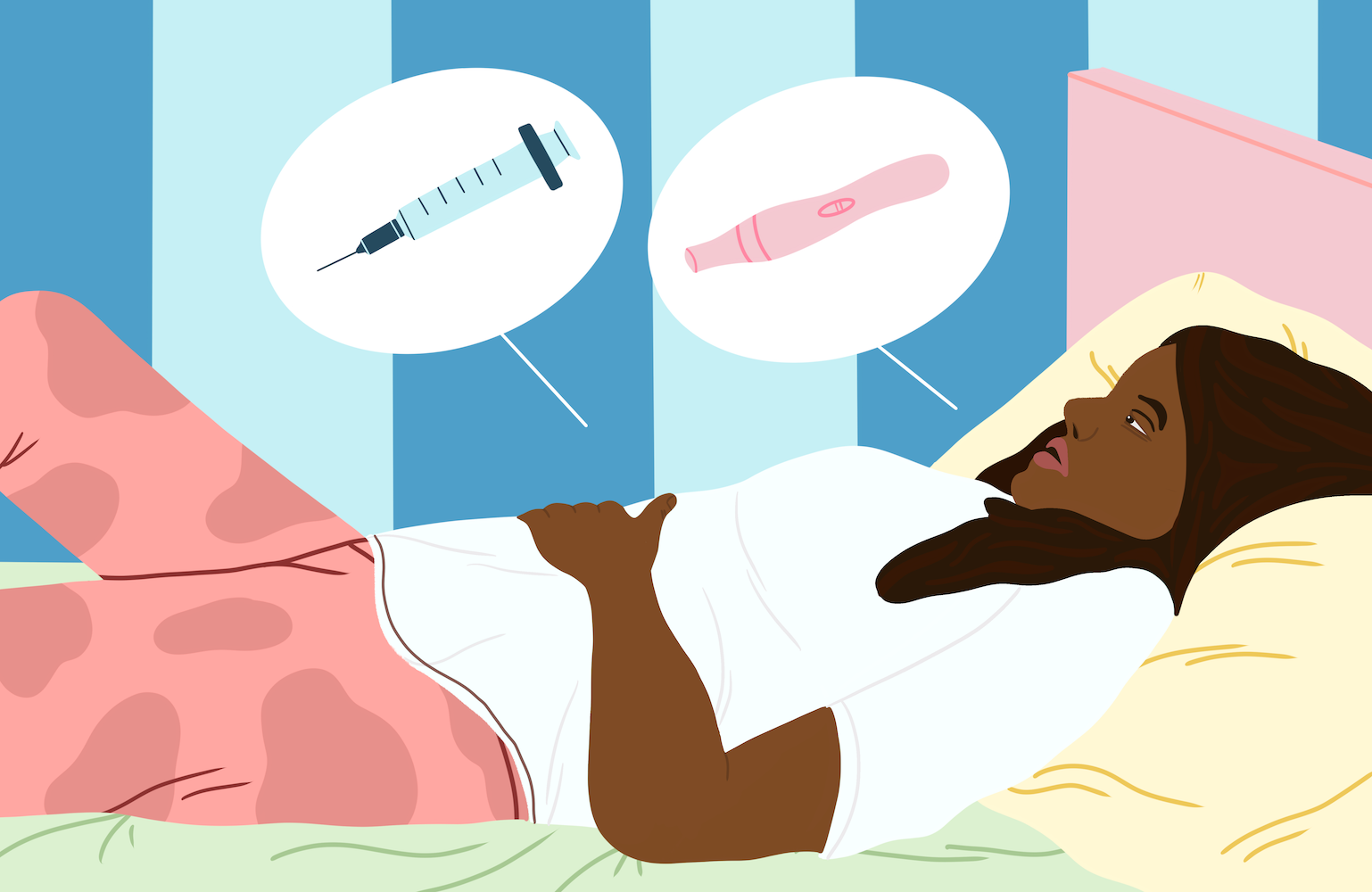
When I was going through my second round of in vitro fertilization (IVF), it was a closely guarded secret. Only a few family members knew. To keep my secret safe, I'd tell a white lie about why I wasn't in the mood to get together for drinks with neighbors. The trip I took halfway across the country to undergo my embryo transfer? I told friends I was visiting my sister who lived in New York City.
No one knew that for those next nine days I could barely eat or sleep until I learned whether the cycle had been successful. And it was. My husband and I were thrilled, but again, we kept the news to ourselves. Truth is, that made dealing with my subsequent miscarriage in late March 2020 slightly easier because I didn't have to share the sad news.
Although I wanted support, my first experience with IVF taught me few people can relate. Comments from well-meaning friends like, "Why would you put yourself through this?" and, "If it's meant to be, it'll be," stung, even though I knew they weren't trying to hurt me. That's why this time I'd been so hush-hush. But now after all was said and done, I was left feeling isolated and ashamed that yes, I'd put myself through this, and no, I guess it wasn't meant to be (I'm typing these words angrily, FYI).
My grief was also compounded by the fact that this was right around the time the world came to a standstill because of the coronavirus pandemic. Alone at home, I cried myself to sleep for weeks—maybe longer. Like everyone else, I'd lost track of time.
Then, one night I found myself confiding in a neighbor while our kids were outside playing. Call it liquid courage (I'd enjoyed my first glass of wine in a while), or the fact that she shared first, but I suddenly felt less afraid to open up. Especially since it turns out she had also gone through IVF and, like me, had suffered a miscarriage. All the years we'd lived on the same street and I'd never known her story.
I started to realize when you've gone through IVF (and a miscarriage for that matter), you become a member of an underground club. It's only when you open up that others reveal their membership.
Why Feeling Isolated During IVF Is Normal
When you're going through IVF, the first trimester starts months before you ever (hopefully) get pregnant. From that first test, to the embryo transfer, and throughout the long, two-week wait to find out if, after all those injections and uncertainty, you are pregnant, many women don't reveal to even close friends they are undergoing fertility treatments. The silence largely results from feeling no one understands, because so few people talk about infertility.
Tamar Gur, M.D., P.h.D., a maternal fetal medicine psychiatrist at Ohio State University, says the stigma surrounding IVF, no matter how antiquated, is still very much real. And yet about one in seven couples may have trouble conceiving, and, according to a 2018 Pew Research Study, about 33 percent of Americans said "they or someone they know has used some type of fertility treatment in order to try to have a baby."
Susan Hudson, M.D., a reproductive endocrinologist with Texas Fertility Center and co-founder of the podcast Fertility Docs Uncensored, who went through IVF herself, agrees. "The feeling of isolation is very common to all people struggling with infertility," says Dr. Hudson. "No one grows up planning to have trouble getting pregnant. It is one of the things in life most people take for granted, so when it doesn't happen easily, it is very natural for people to put up walls of protection. Those walls are meant to ensure privacy around something very personal. But those same walls can make it harder to cope."
How the Pandemic Heightens Isolation
When, on March 17, the American Society for Reproductive Medicine (ASRM) recommended that fertility treatments be suspended because of the pandemic, the fertility community reeled. "It is especially painful for those dealing with an infertility diagnosis to see the treatments they need labeled as 'elective' or 'non-urgent.' There is nothing 'elective' about having endometriosis, polycystic ovary syndrome (PCOS), male factor infertility, or countless other diagnoses that affect fertility," says Elyse Ash. She is the founder and CEO of the fertility mentorship app, Fruitful Fertility, which affords couples a way to gain support by matching them up with a fertility mentor, who can help guide them through the process and answer questions.
Unfortunately, living in quarantine has only served to heighten the sense of urgency for many women and couples all too used to the waiting game. And the situation has led to an even more intense sense of isolation, as normal routines and outlets for stress become challenged.
Colorado-based mom Brandy Schultz can relate; she had to put her plans to undergo IVF on hold because of COVID. "As soon as I heard my IVF clinic was open again, I got on the schedule for the first available appointment," says Schultz. But the owner of Adventure Nannies, who had also gone through IVF prior, said her experience this time is completely different. "My husband hasn't been allowed to attend any of the appointments," she explains. "I have a handful of girlfriends who have experienced fertility issues, and we haven't been able to spend time together and support each other like we normally would."
But those going through IVF right now should give themselves much-deserved credit. "This is harder than it already would have been under normal circumstances," says Dr. Gur. "It's OK to feel stressed; don't beat yourself up."
Ways to Find the IVF Support You Need
Despite how difficult the process can be, voluntarily staying isolated during the process of IVF isn't always the best decision. "As someone who went through IVF myself, it took a lot of energy to keep secrets," says Dr. Hudson. And finding the right support can make all the difference throughout one's infertility journey.
Everyone going through infertility is different, and it's about being as open as you can, suggests Dr. Gur. "You never know where sources of support may come from."
Reaching out to a counselor is a great idea and that can happen virtually in the midst of the pandemic. If you feel comfortable, open up to a friend or colleague, or join an online support community. You can find online support groups through the fertility organization Resolve and even on Facebook. Follow people like Hilariously Infertile on Instagram who help to find the light side of your journey.
"Some online communities are more supportive than others," cautions Dr. Gur, and encourages women and couples to be super-cognizant of how the experience makes them feel. Sharing online "might exacerbate your fertility anxiety. If it becomes more stressful than helpful, walk away."
For Schultz, however, being able to share online was the silver lining in being so isolated during her cycle. "I've been more open about the process on social media and received a lot of encouragement from people going through something similar. In the past, I wouldn't have considered sharing anything about our fertility journey online, but now it's one of the only ways we have to connect with others."
Another helpful tip? Ash suggests focusing on the things you can control at this time, however small, like taking a walk every day, cooking, and meditating. She also encourages us not to feel shame for focusing so much on our fertility. "You're not a bad person for feeling heartbroken about a delayed cycle when people are dying of COVID-19," says Ash. "You have the right to make the decisions that work best for your family, values, budget, and timeline. There is no one right way to do this."
And, in the same way that you may find support in an unexpected place, you may also realize you aren't getting back what you'd hoped for when you open up. Ash's advice is to direct family and friends on specific ways to support you during your IVF journey. "Your network wants to show up for you, they just don't always know how."
However, if you find someone isn't supporting you in a way that feels good, remember, you don't owe updates to anyone. "You can always redraw your boundaries. You get to choose who you let in and who you open up to," says Ash. Dr. Gur agrees, advising those going through IVF to stay away from anyone who makes you feel worse, not better.





